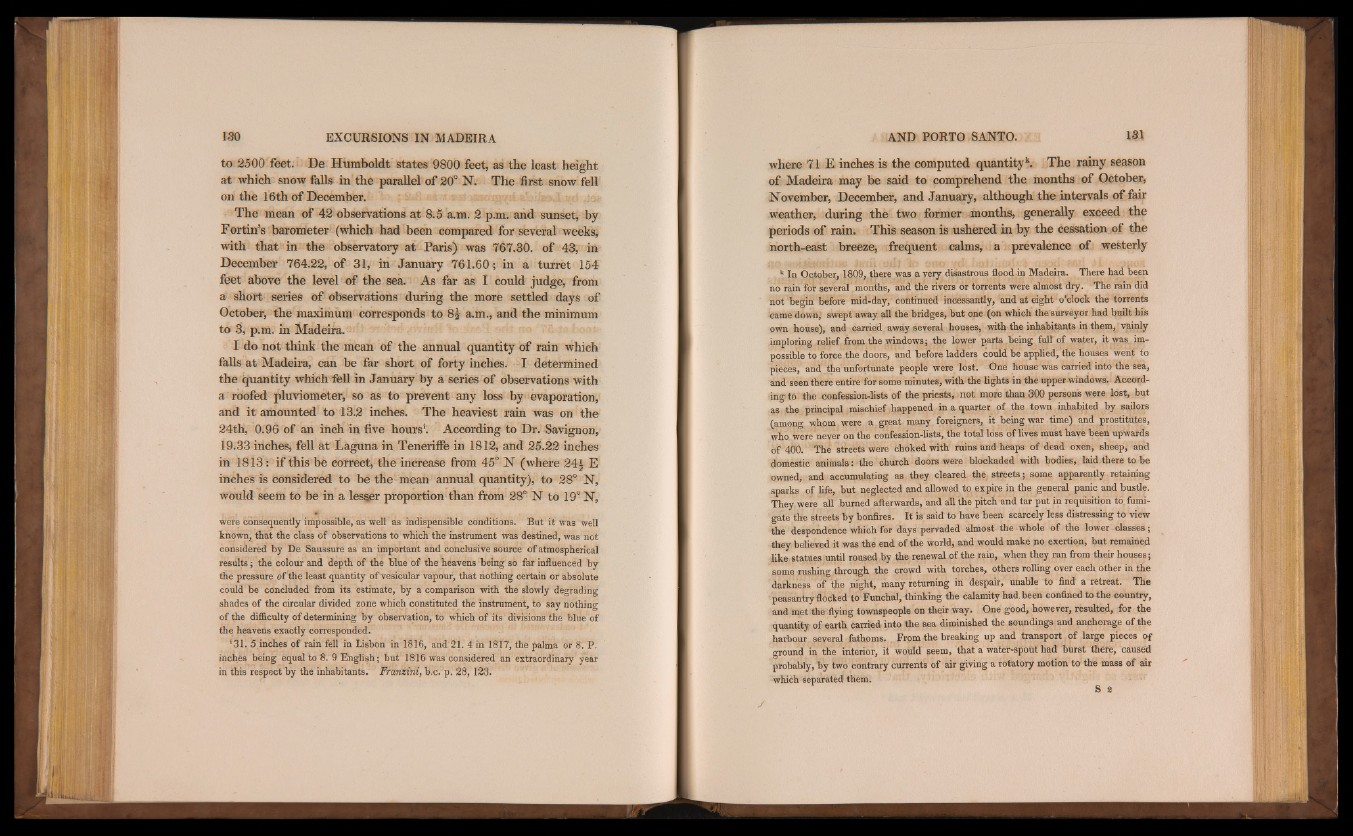
to 2500 feet. De Humboldt states 9800 feet, as the least height
at which snow falls in the parallel of 20° N. The first snow fell
on the 16 th of December.
The mean of 42 observations at 8.5 a.m. 2 p.m. and sunset, by
Fortin’s barometer (which had been compared for several weeks,
with that in the observatory at Paris) was 767.30. of 43, in
December 764.22, of 31, in January 761.60 ; in a turret 154
feet above the level of the sea. As far as I could judge, from
a short series of observations during the more settled days of
October, the maximum corresponds to 8J a.m., and the minimum
to 3, p.m. in Madeira.
I do not think the mean of the annual quantity of rain which
falls at Madeira, can be far short of forty inches. -I determined
the quantity which -fell in January by a series of observations with
a roofed pluviometer, so as to prevent any loss by evaporation,
and it amounted to 13.2 inches. The heaviest rain was on the
24th, 0.96 of an inch in five hours’. According to Dr. Savignon,
19.33 inches, fell at Laguna in Tenerifie in 1812, and 25.22 inches
in 1813: if this be eorrect, the increase from 45° N (where 241 E
inches is Considered to be the mean annual quantity), to 28° N,
would seem to be in a lesser proportion than from 28° N to 19° N,
were consequently impossible, as well as indispensible conditions. But it was well
known, that the class of observations to which the instrument was destined, was not
considered by De Saussure as an important and conclusive source of atmospherical
results; the colour and depth of the blue of the heavens being so far influenced by
the pressure of the least quantity of vesicular vapour^ that nothing certain or absolute
could be concluded from its estimate, by a comparison with the slowly degrading
shades of the circular divided zone which constituted the instrument, to say nothing
of the difficulty of determining by observation, to which of its divisions the blue of
the heavens exactly corresponded.
*31. 5 inches of rain fell in Lisbon in 1816, and 21. 4 in 1817, the palma or 8. P.
inches being equal to 8. 9 English; but 1816 was considered an extraordinary year
in this respect by the inhabitants. FranziHi, b.c. 'p. 28, 123.
where 71 E inches is the computed quantityk. The rainy season
of Madeira may be said to comprehend the months of October,
November, December, and January, although the intervals of fair
weather, during the two former months, generally exceed the
periods of rain. This season is ushered in by the cessation of the
north-east breeze, frequent calms, a prevalence of westerly
* In October, 1809, there yvas a yery disastrous flood in Madeira. There had been
no rain for several ' months, and the rivers or torrents were almost dry. The rhiri did
not begin before mid-day, continued incessantly, and at eight o’clock the torrents
came down; swept away all the bridges, but one (on which the surveyor had built his
own house), and carried away several houses, with the inhabitants in them, vainly
imploring relief from the windows; the lower parts being fulTof water, it was impossible
to force the doors, and before ladders could be applied, the houses went' to
pieces, and the unfortunate people were lost. One house was carried into the Séà,
and seen there entire for some minutes, with the lights in the upper windows. According
to the confession-lists of the priests, not more than 300 persons were lost, but
as the principal mischief happened in a quarter of the town inhabited by sailors
(among whom were a great many foreigners, it being war time) and prostitutes,
who Were never on the confession-lists, the total loss of lives must have been upwards
of 4éfÔ. Thé streets were 6hoked with ruins and heaps of dead oxen, sheep, and
domestic animals: the church doors were blockaded with bodies, laid there to be
owned, and accumulating as they cleared the streets ; some apparently retaining
sparks of life, but neglected and allowed tp expire in the general panic and bustle.
They were" all burned afterwards, and all the pitch and tar put in requisition to fumigate
the streets by bonfires. It is said to have been scarcely less distressing to view
the despondence which for days pervaded almost the whole of the lower classes;
they believed it was the end of the world, and would make no exertion, but remained
like statues until roused by the renewal of the rain, when they ran from their houses;
some rushing through the crowd with torches, others rolling over each other in the
darkness of the night, many returning in despair, unable to find a retreat. The
peasantry flocked to Funchal, thinking the calamity had. been confined to the country,
and met thé flying townspeople on their way. One good, however, resulted, for the
quantity of earth carried into the sea diminished the soundings and anchorage of the
harbour several fathoms. , From the breaking up and transport of large pieces of
ground in the interior, it would seem, that a water-spout had burst there, caused
probably, by two contrary currents of air giving a rotatory motion to the mass of air
which separated them. S 3
-